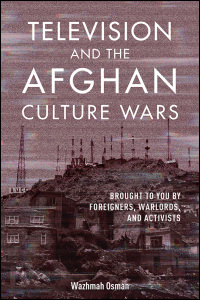This review examines Wazhmah Osman’s book Television and the Afghan Culture Wars, an ethnographic study of television media in Afghanistan. The book explores the Afghan mediascape through richly detailed interviews with media industry professionals and local Afghans, which provide a realist portrayal of the perils and triumphs of media houses in Afghanistan, local cultural contestations, changing gender norms, and the role and reception of television in the nation’s rather tumultuous political and cultural life. Osman deflates the dominant notion in Western discourses of Afghanistan as a “hopeless landscape of powerless people,” (2) arguing that there is a thriving, internationally backed media infrastructure and a hopeful, culturally conscious citizenry in the nation. She argues that despite Afghanistan’s history of violence, ethnic tensions, atrocities against women, and imperialistic agendas by foreign powers, the Afghan media sector is a widely accessible platform for retribution against years of underdevelopment and war, with “the potential to underwrite democracy, national integration, and peace” (3).
Articles by Aparna Shastri
Aparna Shastri is a first-year doctoral student of Cultural Studies at George Mason University. Her research interests include contemporary visual culture, global television studies, South Asian cinema studies, and postcolonial studies. She holds an MA in Writing, Rhetoric, and Media from Clemson University.
